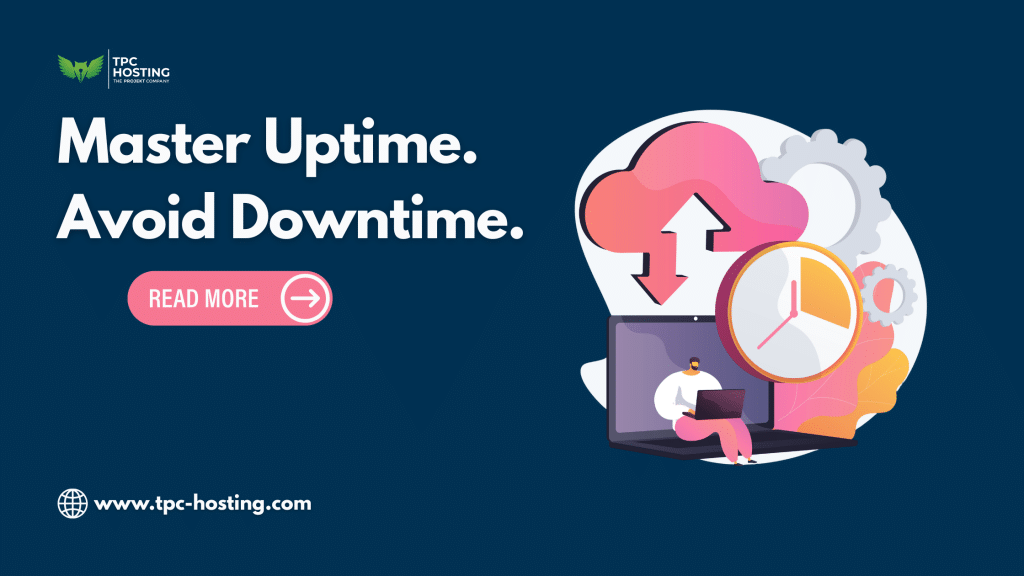
Understand Uptime and Downtime in Web Hosting
Uptime and downtime are crucial concepts when it comes to web hosting. Uptime refers to the period when your website is live and accessible to visitors, while downtime is the period when your site is unavailable. These metrics are essential because they directly affect a website’s reliability and user experience.
A website with high uptime ensures that visitors can access content whenever they want. This can lead to happier customers and better business results. Conversely, more downtime means missed opportunities and can frustrate users. Regular interruptions can also harm your site’s reputation and affect its performance in search engine rankings.
Understanding the nuances of uptime and downtime can help businesses make informed decisions about their hosting solutions. This understanding becomes even more valuable as we explore how the TPC Hosting solutions can offer enhanced reliability and performance, keeping your website up and running smoothly.
Understanding Uptime and Downtime Basics
Uptime and downtime are two key terms that everyone involved with web hosting should know. Uptime is the duration your website remains online and accessible to users. When people can visit your site without any issues, that’s uptime working in your favour. On the other hand, downtime is when your site is unavailable, preventing visitors from accessing content or services.
These metrics are hugely important. High uptime results in a better user experience. Think about it – if someone wants to visit your site and finds it down, they might quickly move on to a competitor. More uptime means your site is there whenever visitors need it, leading to happier customers and more opportunities for success.
Website availability ties directly to user experience, too. A site that’s consistently up keeps visitors satisfied because it loads quickly and functions smoothly. On the flip side, frequent downtime could mean slow load times and frustrated users, which might discourage them from returning. So, maintaining high uptime isn’t just about keeping your site running; it’s about ensuring a pleasant and dependable experience for your visitors.
How Uptime Affects Business Success
Businesses rely on uptime because it directly impacts critical aspects like online sales and customer satisfaction. When your site is available round-the-clock, it opens the door for more sales since visitors can browse and make purchases without interruption. A site with high uptime can boost customer confidence, reinforcing the idea that your business is reliable and ready to serve at all times.
Uptime also plays a part in search engine rankings. Search engines favour sites that are consistently accessible and penalise those with regular downtime. When your site remains online and fast, it’s likely to rank higher, making it easier for potential customers to find you.
Real-world scenarios illustrate why high uptime is crucial. For instance, an e-commerce store having downtime during a big sale can mean significant revenue loss. Similarly, a business relying on web appointments could lose clients if downtime blocks access to scheduling systems. Other examples are online platforms that rely on user interaction; any downtime there can disrupt engagement and drive users away.
Understanding and maintaining uptime can transform your business, ensuring you don’t miss out on essential opportunities and keeping your online presence as strong as possible.
Common Causes of Downtime
Both technical and non-technical issues can contribute to website downtime. Understanding these can help better prepare you for such events.
Technical Reasons:
- Server Failures: Machines hosting your site can sometimes crash or encounter problems, leading to temporary unavailability.
- Network Issues: Interruptions in the network paths connecting users to your server can cause downtime.
- Software Bugs: Errors in the website’s code can make parts of the site inaccessible or cause it to crash altogether.
Non-Technical Reasons:
- Maintenance: Scheduled updates or improvements are necessary but can lead to short periods of downtime.
- Human Error: Mistakes, like misconfiguring settings or deleting crucial files, can disrupt website function.
- Cyber Attacks: Malicious activities such as DDoS attacks can flood servers with traffic, causing them to become unresponsive.
To minimise downtime, employ a few key strategies:
- Regular Backups: Always have a current copy of your data to quickly restore the site if things go wrong.
- Monitor Performance: Use tools that alert you to any unusual site behaviour or slowdowns.
- Improved Security Measures: Implement firewalls and other security protocols to protect against attacks.
Maximising Uptime with TPC Hosting
TPC Hosting provides robust tools and reliable solutions to ensure your website maintains high uptime and exceptional reliability. Key features include:
Automatic Backups: Our web hosting and VPS hosting plans offer regular automated backups, minimising data loss risk and enabling rapid recovery after unforeseen incidents.
Advanced Infrastructure: TPC Hosting utilises high-quality servers and networks to ensure stable and efficient website performance, significantly reducing downtime risks.
Proactive Monitoring: We offer 24/7 server monitoring to swiftly identify and resolve any performance issues, ensuring minimal disruption to your website visitors.
Flexible Scalability: Our VPS hosting solutions allow easy scalability, enabling you to quickly adjust resources as your website traffic grows or experiences sudden spikes, all without service interruptions.
Businesses can leverage these features by:
Setting Up Automatic Notifications: Receive real-time alerts about potential issues, eliminating the need for constant manual checks and enabling proactive issue resolution.
Scheduling Maintenance Strategically: Plan regular maintenance tasks during off-peak hours using our hosting management tools, minimising any impact on visitor experience.
Conclusion
Keeping your website consistently online is critical to achieving successful digital operations. Uptime and downtime directly impact your business credibility, user experience, and revenue. Understanding the causes of downtime and adopting effective hosting strategies and tools is essential for maintaining a reliable online presence.
At TPC Hosting, we recognise the importance of dependable hosting. Our cloud hosting services offer powerful solutions designed specifically to maximise uptime and reliability. Choose TPC Hosting to keep your website running smoothly, allowing you to concentrate on what matters most—growing your business.









